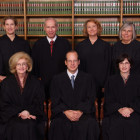
Poll Shows Young People Fear Country is on Wrong Track, But Still Support Obama by Wide Margin
|
Only one in five young people believe the United States is heading in the right direction, yet more are still likely to vote for President Barack Obama in the next election, according to a recent poll by Harvard’s Institute of Politics. The national poll of 3,096 millennials – the term sometimes used to refer to people between the ages of 18 and 29 – found that nearly twice as many young people thought the country is “on the wrong track” than those who said it is heading in the right direction, while 36 percent weren’t sure. But those figures don’t necessarily paint a positive picture for Republican presidential hopeful Mitt Romney. Obama’s approval ratings among those polled improved to 52 percent, up six points from a previous low in late 2011, bringing his lead over Romney to a strong 17 percentage points. “Over the last several months, we have seen more of the millennial vote begin to solidify around President Obama and Democrats in Congress,” Harvard Institute of Politics Director Trey Grayson said in a press release.










